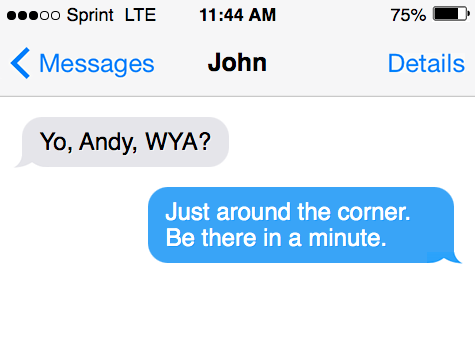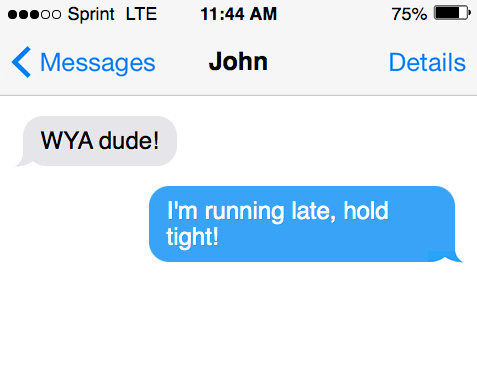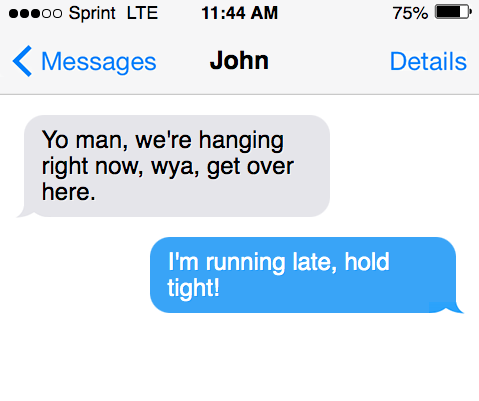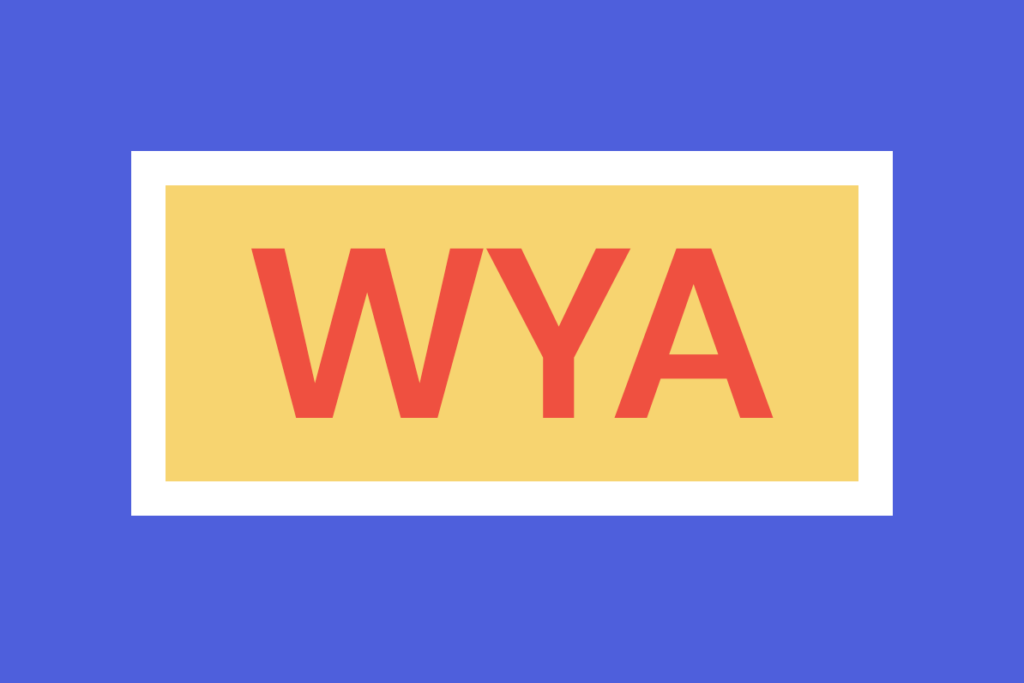What does “WYA” mean? When someone texts, “WYA,” what are they trying to say? The English language is changing thanks to the internet and digital culture. Acronyms like “WYA” are gaining in popularity to save keystrokes. Although, it can be confusing to comprehend what it means.
Learn what “WYA” means in this short guide…
“WYA” meaning and definition
“WYA” stands for, “Where Ya At?” It is a type of question, proposition, or inquiry to ask someone about their current location. It is typically used by friends who want to ask each other to hang out. A type of conversation starter.
For example, a friend could say, “WYA, I want to hang out!” Meaning, “Where are you at? I would love to hang out with you.”

Capitalization
Commonly, the letters in the acronym are either ALL CAPS or all lowercase.
Correct: WYA
Correct: wya
Incorrect: Wya
Incorrect: wYA
Intention
The synonyms related to the acronym are as follows:
- Conversation starter
- Proposition
- Inquisition
Usage
Typically, the use of “WYA” is over electronic communication or direct messages on social media platforms.
Social media: Snapchat, TikTok, Instagram, Facebook, and Twitter.
Texting: Group or one-to-one communications.

History of “WYA”
The acronym “WYA” began use around 2012, according to Urban Dictionary. While the term has always meant, “Where ya at?” The acronym can often get confused with other associations and organizations.
Google Trends shows that this has become a popular acronym amongst young people over the last 8 years. Showing popularity gaining around 2016.
Other meanings:
- World Youth Alliance (reference)
- Wherever You Ate
- Were You At
- William Y Arms
- World Yoga Alliance (reference)
- War of Yankee Aggression
These alternate meanings are far less common than the internet slang definition, “Where you at?”
How to respond to, “WYA”
To respond to “WYA,” someone could allude to their current whereabouts. The intention of the question is to make a plan between two people.
A conversation starter typically begins discussion between two people. The intention of the first person who is saying “WYA” is to make a plan with the person they are reaching out to.

Here are example responses:
- “Running a little late. I will be there shortly! Hang out for a little bit of time.”
- “I’m around the corner dealing with some errands.”
- “I’m hanging out today. What are you up to?”
Example of “WYA” getting used
Here are conversation examples where the abbreviation “WYA” is getting used in a conversation. These conversation examples show how a friend could start a conversation using the initialism “WYA.”
Example one
Friend 1: “Yo, Jason, WYA!?”
Friend 2: “I’m by the pool right now. Do you want to come hang out?”
In this example, two friends are communicating with each other about their current plans. The first friend is using the slang term to begin the conversation and ask where the other friend is.
Example two
Friend 1: “We’re up at the pool right now hanging out, WYA!”
Friend 2: ” I know, I’m running really late. I’m sorry about that. I will be over there shortly. Just wait for me if that’s okay? I’ll be there in about five minutes.”
The second example shows a friend using “WYA” in the middle of a sentence. It could get used with either a question mark or exclamation point at the end. Both are intended to communicate the same meaning, “Where you at?”
Conclusion
In these example conversations, it is common for young people to use the “WYA” acronym to begin a conversation.
Similar acronyms
Similar abbreviations that are used between two friends.
WUP: Standing for, “What’s up?” Another way to ask someone to start a conversation.
SUP: Or, “What’s up?” An internet slang term to inquire about plans.
S^: Similar to “SUP” and using unique keystrokes to allude to the word, “up.”
W/U: Another way to say, “What’s up?”
Sources
- Wya – Urban Dictionary
- What Does WYA Stand For and Mean? – ProWritingAid
- What Does WYA Mean? | The Word Counter
- What Does WYA Mean? – Cyber Definitions
- way – Wiktionary
Inside this article
Fact checked:
Content is rigorously reviewed by a team of qualified and experienced fact checkers. Fact checkers review articles for factual accuracy, relevance, and timeliness. Learn more.
Core lessons
Glossary
- Abstract Noun
- Accusative Case
- Anecdote
- Antonym
- Active Sentence
- Adverb
- Adjective
- Allegory
- Alliteration
- Adjective Clause
- Adjective Phrase
- Ampersand
- Anastrophe
- Adverbial Clause
- Appositive Phrase
- Clause
- Compound Adjective
- Complex Sentence
- Compound Words
- Compound Predicate
- Common Noun
- Comparative Adjective
- Comparative and Superlative
- Compound Noun
- Compound Subject
- Compound Sentence
- Copular Verb
- Collective Noun
- Colloquialism
- Conciseness
- Consonance
- Conditional
- Concrete Noun
- Conjunction
- Conjugation
- Conditional Sentence
- Comma Splice
- Correlative Conjunction
- Coordinating Conjunction
- Coordinate Adjective
- Cumulative Adjective
- Dative Case
- Determiner
- Declarative Sentence
- Declarative Statement
- Direct Object Pronoun
- Direct Object
- Diction
- Diphthong
- Dangling Modifier
- Demonstrative Pronoun
- Demonstrative Adjective
- Direct Characterization
- Definite Article
- Doublespeak
- False Dilemma Fallacy
- Future Perfect Progressive
- Future Simple
- Future Perfect Continuous
- Future Perfect
- First Conditional
- Irregular Adjective
- Irregular Verb
- Imperative Sentence
- Indefinite Article
- Intransitive Verb
- Introductory Phrase
- Indefinite Pronoun
- Indirect Characterization
- Interrogative Sentence
- Intensive Pronoun
- Inanimate Object
- Indefinite Tense
- Infinitive Phrase
- Interjection
- Intensifier
- Infinitive
- Indicative Mood
- Participle
- Parallelism
- Prepositional Phrase
- Past Simple Tense
- Past Continuous Tense
- Past Perfect Tense
- Past Progressive Tense
- Present Simple Tense
- Present Perfect Tense
- Personal Pronoun
- Personification
- Persuasive Writing
- Parallel Structure
- Phrasal Verb
- Predicate Adjective
- Predicate Nominative
- Phonetic Language
- Plural Noun
- Punctuation
- Punctuation Marks
- Preposition
- Preposition of Place
- Parts of Speech
- Possessive Adjective
- Possessive Determiner
- Possessive Case
- Possessive Noun
- Proper Adjective
- Proper Noun
- Present Participle
- Prefix
- Predicate



